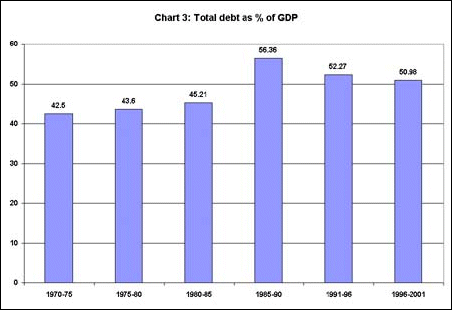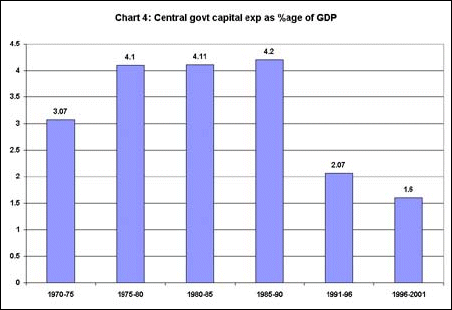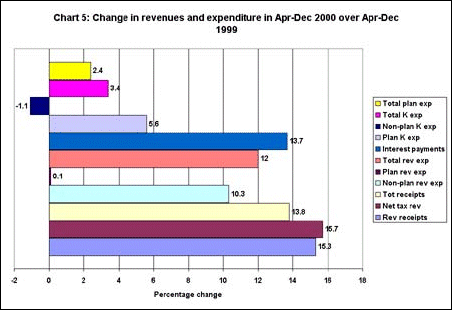|
It is sad to think that these
considerations were not recognised by the Committee
or the subsequent framers of the bill, whose concern
seems to have been essentially to impose those measures
which are viewed as necessary to placate or impress
finance capital, both domestic and international. The
only honourable exception to this within the Committee
appears to have come from the unlikely source of the
office of the Comptroller and Auditor General of India.
The C&AG's representative had to make the obvious
point that "no fresh legislation of the FRA type
was required since a ceiling on borrowings by the Government
could be prescribed by law under Article 292 of the
Constitution, or through annual legislation as part
of the budget, and other medium or long term fiscal
measures could be declared by Government in a policy
paper." This office was also forced to remind the
rest of the Committee of the final authority of Parliament
in our democracy, even and especially in matters relating
to the public fisc, and to point out that "setting
up a Fiscal Management Review Committee through statute
(as proposed in the Report) ... goes against the basic
structure of the Constitution."
The undemocratic nature of the proposed legislation
is hinted at by the office of the C&AG. It is further
disturbing to realise that such legislation could be
framed in a macroeconomic context of slowdown which
urgently demands significant public intervention to
lift industry out of recession, to clean up the mess
with respect to public foodgrain stocks and provide
more food to those in need of it and through productive
public employment schemes, and to address the major
problem of decelerating aggregate employment generation.
The Committee uses the increasing trends in government
deficits - described in Chart 1 - to justify its concern
with fiscal consolidation and control. But one major
reason for the large deficits is precisely the much
greater share taken up by interest payments, which is
shown in Chart 2. In the last five years, not only have
interest payments reached historically high levels as
percent of GDP, but they amounted to around 30 per cent
of total government expenditure and more than 36 per
cent of revenue expenditure.

Chart
1 >>
Click to Enlarge

Chart
2 >>
Click to Enlarge
It is a mistake to believe - as is continuously suggested
by Government and repeated in the Committee's Report,
that this is due entirely to the burden of past debt.
A substantial role has also been played by financial
liberalisation measures which have raised the cost of
Government borrowing and caused both the interest payments
and the total public debt to be much higher than they
otherwise would have been. This is particularly clear
from Chart 3, which shows that public debt as a share
of GDP actually declined in 1996-2001, even though interest
payments continued to rise to their highest ever levels.

Chart
3 >>
Click to Enlarge
Meanwhile, of course, capital
expenditure by the Central Government continues to decline
as a share of GDP, as evident from Chart 4. And this
decline is not just over the past ten years; it has
been especially marked during the tenure of the BJP-led
government, which has been remarkable in suppressing
plan and capital expenditures well below even their
budgeted outlays in each year in power.

Chart
4>>
Click to Enlarge
This trend continues into the
current year, as can be seen from Chart 5. Thus, over
April-December 2000, while revenue receipts increased
by more than 15 per cent in current prices over the
corresponding period in the previous year, both plan
and capital expenditures have increased only marginally
in current prices. Given the rate of inflation, this
implies that they have actually fallen in constant price
terms.

Chart
5>>
Click to Enlarge
The most misleading thing about such Committee Reports
and such legislation, is that they present their assumptions
and conclusions as technocratic necessities rather than
blatant political choices. But in fact, such decisions
about overall expenditure, its distribution and deficit
control, are deeply political and reflect the choice
of favouring certain economic groups in society - especially
finance - over others.
Indeed, the act as framed does seem to recognise certain
political realities. For example, Section 10 of the
Act provides immunity to the Central government and
its officers for anything done in good faith under the
Act. And, most blatantly, the Act leaves the current
Finance Minister, its mover, almost totally outside
the discipline it purports to impose. Thus, sub-section
(1) of Section 5 imposes the commandment that the "The
Central Government shall not borrow from the Reserve
Bank". But sub-section 5(3) says "Notwithstanding
anything contained in sub-section (1), the Reserve Bank
may subscribe to the primary issues of the Central Government
securities during the financial year beginning on
the 1st day of April. 2001 and subsequent
two years" (emphasis added).
Similarly, section 12, the final section of the Act
reads: "If any difficulty arises in giving effect
to the provisions of this Act, the Central government
may, by order published in the Official Gazette, make
such provisions not inconsistent with the provisions
of this Act as may appear necessary for removing this
difficulty: Provided that no order shall be made
under this section after the expiry of two years from
the commencement of this Act" (emphasis added).
In other words, the Act makes itself practically inoperative
for the next two years and would thereafter only hobble
governments which are unable to amend the relevant sub-sections.
This government therefore wants to win kudos from international
investors for its supposed fiscal sobriety, while passing
on the real discipline and costs of such control to
future governments. It is not only based on poor economics,
it is also deeply undemocratic in denying future governments
the capacity to respond to felt social requirements.
The essentially political and distributive features
of such legislation which is supposedly "neutral"
in being determined only by objective economic realities,
becomes very clear in a story narrated by the well-known
American economist Joseph Stiglitz. When he was Chairman
of the Council of Economic Advisers to the President
during Clinton's first term, there was a motion moved
by a Republican legislator to provide policy independence
to the Federal Reserve, the United States' central bank.
The reasons proffered were very similar to those cited
in the Report being considered here. Stiglitz persuaded
President Clinton to announce that this would be made
an election issue. Within a matter of a few days, the
proposed legislation was withdrawn, as the Republicans
realised that voters would react against a measure that
would reduce democratic accountability of an institution
with crucial economic clout to affect economic activity
and jobs.
Stiglitz ended his story
with the clear statement that monetary and fiscal matters
are essentially about politics, because they determine
income distribution outcomes. It is important that this
message gets across equally clearly to our voters and
political parties as well, so that such an attempt,
as is being made in this proposed legislation, to privilege
the financial class over the interests of all other
citizens cannot succeed.
|

